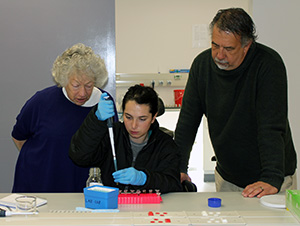Latest News Archive
Please select Category, Year, and then Month to display items
03 October 2024
|
Story Ansie Barnard
|
Photo Supplied
 From left to right: Londeka Mkhwanazi, Semither Mkhize, Salima van Schalkwyk, Slindokuhle Ndlovu, Asanda Mpinga, Mantombi Molefe, Ntombinkulu Khumalo, Mosebjadi Chauke and Thembinkosi Mkhwanazi.
From left to right: Londeka Mkhwanazi, Semither Mkhize, Salima van Schalkwyk, Slindokuhle Ndlovu, Asanda Mpinga, Mantombi Molefe, Ntombinkulu Khumalo, Mosebjadi Chauke and Thembinkosi Mkhwanazi.
The Amrut Foundation, in partnership with the University of the Free State (UFS), successfully hosted its Inaugural Innovathon at the UFS Qwaqwa Campus. This competition is designed to identify and support innovative products and services that not only generate profit but also contribute to the public good, with a strong emphasis on ethical business practices. Through this collaboration, students gain national exposure for their businesses and receive support to create sustainable social enterprises.
Five teams of student social entrepreneurs from the Qwaqwa campus were shortlisted to participate in the regional finals. Their selection was based on ventures that adhered to a social entrepreneurship model and demonstrated plans for long-term profitability and sustainability.
During the Innovathon, a panel of judges from the UFS, the Amrut Foundation, and the Small Enterprise Development Agency (SEDA) selected two outstanding teams to represent the UFS at the national finals, which will take place in October. The winning ventures, Biofly-Pro and Root Rescue were each awarded R20,000 to further develop and expand their initiatives.
Hemang Desai, Executive Director of the Amrut Foundation, expressed his enthusiasm for the event: "Amrut is proud to co-host the Free State leg of the inaugural Innovation Challenge with the UFS. Supporting students with entrepreneurial ambitions that align with societal care is one of our key focus areas."
Dr Grey Magaiza, Senior Lecturer and Deputy Director for the Centre for Gender and Africa Studies at the UFS, highlighted the importance of social entrepreneurship: “Social entrepreneurship is a collaborative effort towards creating sustainable and ethical business processes. The two winning projects embody these principles, and we look forward to their continued growth. In line with our Vision 130, social entrepreneurship can serve as a critical lever for university-community engagement.”
Congratulations to Biofly-Pro and Root Rescue on their well-deserved achievements!
Monkey research attracts international attention
2016-07-11

Prof Trudy Turner from the University of
Wisconsin-Milwaukee and Prof Paul Grobler
from the Department of Genetics at the
University of the Free State, together with one
of the students researching monkey genes.
Photo: Siobhan Canavan
For this year’s Summer School programme, Prof Paul Grobler, from the University of the Free State Department of Genetics focuses on research about the conflict between monkeys and humans in areas where monkeys are regarded as problem animals.
Global expert part of research
This year, Prof Grobler is hosting a group of students and lecturers from the United States of America (USA). The group includes Prof Trudy Turner from the University of Wisconsin-Milwaukee (UWM), a global expert on vervet monkeys. She has been working with the Department of Genetics at the UFS for the past fifteen years, and has also been appointed as an Affiliated Professor in the department.
“The Summer School programme is an opportunity for the American Primatology students to gain practical experience in Africa,” says Prof Grobler.
International interest in Summer School
This year’s Summer School programme involves four lecturers and nine students. The lecturers are from the University of Wisconsin-Milwaukee (UWM), the University of California, Los Angeles (UCLA), Boston University, and Central Washington University.
“We use the genetic information to determine
how monkeys historically infiltrated the
different areas in South Africa.”
This year’s focus is on the genetic structure of the monkeys in South Africa, and research that is being done on the differences and similarities in monkeys from different areas. “We use the genetic information to determine how monkeys historically infiltrated the different areas in South Africa,” says Prof Grobler.
Local nature reserve acting as host
The group will perform field work, including observing monkeys in the Soetdoring Nature Reserve, as well as laboratory work in the department, where they will be assisted by two laboratory technicians.
Two years ago, Prof Grobler and his department tested this idea on a smaller scale, and now they hope to make this a regular event.